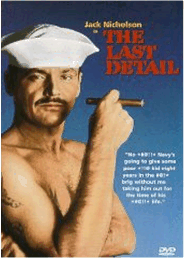Intelligent comic drama about war and real people (7/10)
 Kind of a road picture for soldiers home from the Iraqi front, I don’t think writer/director Neil Burger intends to make an antiwar statement… but pretty much any human being with a heart will take it as such. The quote above, “No, thank you,” occurs at several points in the story as these three soldiers, on leave—Fred Cheaver (Tim Robbins), T.K. Poole (Michael Peña), and Colee Dunn (Rachel McAdams)—make their way across the US. What happens is they have a transaction with a civilian who learns they’re from the front, and the soldier will say thank you to end the exchange, to which the civilian will say, “No, thank you.” With emphasis, expressing the fairly common sentiment that we have toward those in uniform.
Kind of a road picture for soldiers home from the Iraqi front, I don’t think writer/director Neil Burger intends to make an antiwar statement… but pretty much any human being with a heart will take it as such. The quote above, “No, thank you,” occurs at several points in the story as these three soldiers, on leave—Fred Cheaver (Tim Robbins), T.K. Poole (Michael Peña), and Colee Dunn (Rachel McAdams)—make their way across the US. What happens is they have a transaction with a civilian who learns they’re from the front, and the soldier will say thank you to end the exchange, to which the civilian will say, “No, thank you.” With emphasis, expressing the fairly common sentiment that we have toward those in uniform.
In my previous review of the two (anti)war movies in the WW2 genre—Bridge at Remagen and A Bridge Too Far—I brought up the little used quote from Herbert Spencer:
“When men hire themselves out to shoot other men to order, asking nothing about the justice of their cause, I don’t care if they are shot themselves.” —Herbert Spencer.
Tim Robbins … Fred Cheaver
Rachel McAdams … Colee Dunn
Michael Peña … T.K. Poole
Molly Hagan … Pat Cheaver
Mark L. Young … Scott Cheaver
Colee Dunn: Thank you, Cheaver.
Fred Cheaver: No. Thank you.
Even though Spencer’s point gets an A+ for logic, I doubt many of us have the stalwartness to actually feel the way his logic would have us go. And Fred, T.K., and Colee provide perfect illustrations of the sympathies we naturally have toward those who are swept up in the short-war-eternal-dangerous-occupation known as Iraq/Afghanistan. Did they think it out in terms of whether the cause was just? No. We can clearly see each of them has succumbed to large measures of mind control via their government schooling and the ubiquitous “academedia” that tell us what are acceptable thoughts. Critical thinking or conscientious questioning of authority typically do not make it through these mind control processes.
They have learned through the years to accept a standard level of unconsciousness. Are they unconscious then by choice? I tend to think yes, but it’s a qualified choice. They simply have not achieved a level of awareness that would enable them to choose clearly. If I were to have had their same experiences growing up, would I have succumbed? Heck, I can’t really answer that question. So I tend to fall in the “Father forgive them for they know not what they do” camp. Thus,
Guy Named Bob: [Trying to prove something to his anti-war relative] So what are we fighting for over there?
Fred Cheaver: Well, we were mostly just fighting to stay alive.
So as much as I regard lack of good judgment as their own fault—and en masse, this common-man yielding to authoritarianism may yet be the death of our species—I still regard them as “like me,” entitled to the benefit of the doubt and simple humanitarian sentiments. The moment each of them comes on the screen, you can see just how unique and charming each of them is:
- Cheaver is the older man who held a good blue collar job in St. Louis. He’s returning for good thanks to a back injury. I won’t reveal what caused the injury but it’s funny.
- T.K. comes from a family of soldiers and thinks of himself in terms of “doing the right thing.” He wants to be an officer and is on his third tour. He and Colee are both injured in the line of duty, and they’re on extended leave for rest and recuperation.
- Colee grew up on the wrong side of the tracks from a broken home. She enlisted to be with her boyfriend, who, according to the initial story anyway, entered the Army to avoid being prosecuted for a robbery. The boyfriend is killed in action and leaves her a guitar, which may be hot. She’s carting the guitar around throughout the movie.
Quite by coincidence they wind up taking the same flight from Germany back to the states. There’s a power outage in the Northeast and when they land in New York, they’re told they’ll have to wait for a couple of days minimum. Cheaver suggests the three of them grab a rental car before they’re all taken, and they manage to get a van because the attendant wants to give them a break for being in the service.
The plan is to drive straight through to St. Louis where Cheaver lives with his wife and teenage son. Then the two others will proceed to Las Vegas where T.K. plans to hook up with his officer girlfriend he plans to marry and Colee wants to return the guitar to her dead boyfriend’s family (and possibly, eventually be taken in as one of them). Well, the situation with Cheaver’s family has radically changed—I’ll let the reader have the experience of discovering what that is—but it means that Cheaver will proceed with T.K. and Colee all the way to Vegas.
 I’m trying to come up with an analog road movie involving military personnel, and the only thing I can come up with is The Last Detail, with Jack Nicholson, Otis Young, and Randy Quaid. Of course, they’re different movies, with Detail being about a coming of age for a less than bright sailor (Quaid) who receives a harsh prison sentence for a trumped up infraction because it involves a general’s family. The only real parallels are that the journeys take their own sweet time and involve many amusing, instructive, and character developing incidents. So if I had to say why The Last Detail comes to mind, it’s that the pace is so similar.
I’m trying to come up with an analog road movie involving military personnel, and the only thing I can come up with is The Last Detail, with Jack Nicholson, Otis Young, and Randy Quaid. Of course, they’re different movies, with Detail being about a coming of age for a less than bright sailor (Quaid) who receives a harsh prison sentence for a trumped up infraction because it involves a general’s family. The only real parallels are that the journeys take their own sweet time and involve many amusing, instructive, and character developing incidents. So if I had to say why The Last Detail comes to mind, it’s that the pace is so similar.
It’s a treat to watch these excellent actors at work with a script that is down to earth. I suppose one might lament a couple of the plot pieces that make some of the other developments seem predictable, but who cares? McAdams and Robbins are totally right for their roles. So is Peña. It’s not the heaviest of movies, even when dealing with the war issue, but it is first-rate entertainment and storytelling. Very believable, people we all know… and, yes, care for. Regardless of whether they never thought much about “hiring themselves out to shoot other men to order.”
Once again we are presented with the unavoidable observation that shooting other men to order is an irrational act. And I continue to speak out about the level of unconsciousness prevailing in society that permits the Rothschild Formula to have its way with common humanity.[1] Yes, war is hell, and insane, but we’re now on the threshold of ending it by virtue of the emerging consciousness of the Sacred Nonaggression Principle, and its offshoots and corollaries.
###
[1] The Rothschild Formula is a method by which international banks—the term originates with the Rothschild banking dynasty which perfected the practice—of providing credit to all sides in any potential conflict for purposes of military buildup and to propagandize war to the populations. No matter which side wins, the loans are paid in booty or reparations… and typically at very high interest rates. Ref. Creature from Jekyll Island, Chapter 11.
This post has been read 1515 times!

